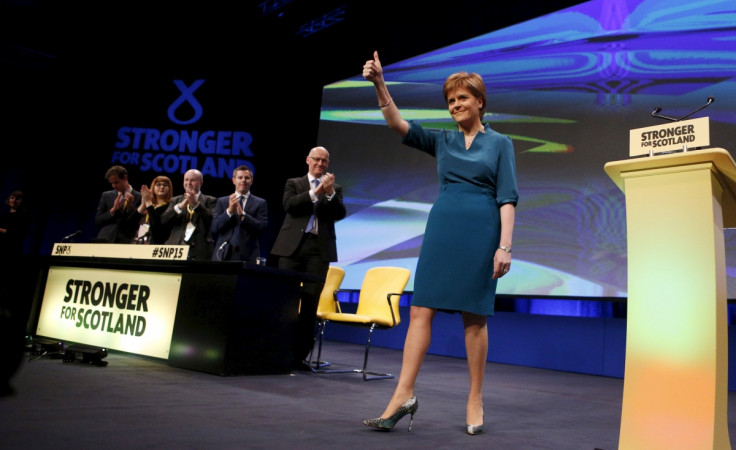SNP conference: Jeremy Corbyn is a non-starter in Scotland but as for a second independence referendum...

As Nicola Sturgeon prepared to make her keynote speech at the SNP's conference, her social media team tweeted that the Aberdeen event had got off to a "flying start", courtesy of a YouGov poll suggesting that the party's mammoth lead over Labour has grown slightly. In truth, "relieved start" would probably be closer to the mark, because Sturgeon must have harboured concerns that the polls would show that one of the most prolonged honeymoons in political history was finally drawing to a close.
A lot of water has passed under the bridge since the late spring and early summer, when the SNP seemed to have their main opponents in an impossible position. Labour couldn't realistically hope to win a majority across the UK without regaining their lost Scottish seats, and it was hard to see how that could be done without moving to the left to regain the trust of working-class converts to the SNP who had come to regard their former party as "Red Tories". But by taking that step, Labour would simply be alienating centrist voters in Middle England even further.
The beauty of Sturgeon's new stance is that it puts the power firmly back into the hands of the dynamic independence movement, both inside and outside the SNP.
So it seemed overwhelmingly likely that Labour would effectively sacrifice their Scottish branch, and instead make a pitch to the fabled "aspirational" voters of the south. The election of the most left-wing Labour leader since George Lansbury in 1935 was the absolute last thing the SNP could have anticipated, and has left Sturgeon scrambling to reconfigure her lines of attack against an opponent which she is no longer able to outflank on the left.
But it appears she needn't have worried. YouGov are in agreement with the recent TNS poll, which showed that Labour now command less Scottish support under Jeremy Corbyn than they did at the general election. Perhaps the most telling finding is that just 9% of the people planning to back Labour in the Scottish Parliament election next May would vote Yes if there was an independence referendum tomorrow – in spite of the fact that overall Yes support is up 3% since last September. The Labour vote clearly remains the unionist rump that it was in the latter days of Ed Miliband.
Corbyn has so far played straight into Sturgeon's hands with his attitude towards Scotland. He has entirely failed to grasp that ex-Labour voters who deserted the party over its stance during the independence referendum are looking for two things : a return to traditional Labour values, and constitutional progress for Scotland. Offering one of those but contemptuously rejecting the other is not a recipe for recovery. Astonishingly, on the eve of the SNP conference, Labour were once again busily shooting themselves in the foot by denouncing the long-overdue plans to devolve abortion law to the Scottish Parliament. Nothing could better illustrate how out of touch they are with Scottish national aspirations than their apparent belief that grown-up issues like abortion must be reserved to a grown-up parliament like Westminster.
So, with a little help from her enemies, Sturgeon took to the rostrum in Aberdeen with far fewer troubles weighing her down than she could have dared to expect a month ago. Her speech essentially drew a line under the temporary concerns about a Corbyn surge, with her focus returning firmly to the resolution of a strategic dilemma that has dogged the SNP since the general election : how to deal with the issue of a potential second independence referendum in next year's manifesto.
And the mist is rapidly clearing on that front. Although specific events like Brexit will still be offered as potential automatic triggers for a referendum, it seems Sturgeon will in future be looking to shifts in public opinion on independence as the most probable "material change in circumstances" that could justify going to the country again.
This new formula will intensify speculation over exactly what the First Minister is trying to achieve. Is she looking to establish the swiftest possible pretext for a new vote, or is she in fact leaving herself a ready-made excuse to back away from the brink? Those who suspect her of doing the latter will point out that support for independence seems to have remained remarkably stable since an initial surge in the weeks after last year's referendum. For as long as that continues to be the case, the SNP leadership will be able to fob off its more gung-ho members and supporters by insisting that the specified precondition has not yet been met.
Sceptics will also point out that support for independence only increased as a direct result of the first referendum being called, and that it's putting the cart before the horse to expect a further Yes surge to occur before a second referendum campaign is actually underway.
But the counter-argument is that the Scottish public is already highly politicised as a result of last year's events, and that an ongoing "campaign state" now exists on the topic of independence. The beauty of Sturgeon's new stance is that it puts the power firmly back into the hands of the dynamic independence movement, both inside and outside the SNP. Activists now know that if they successfully take up the challenge to grow Yes support, the momentum for a new referendum will be unstoppable.
As far as the veterans of the Yes campaign are concerned, the starting-pistol for the next battle has just been fired.
James Kelly is the author of the Scottish pro-independence blog, SCOT goes POP! Voted one of the UK's top political bloggers, you can hear more from James on Twitter at @JamesKelly
© Copyright IBTimes 2025. All rights reserved.





















